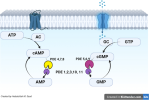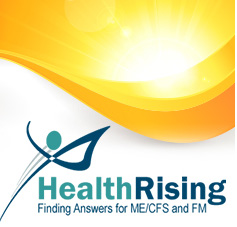I was diagnosed with CFS by Stanford's Dr Montoya many years ago. My symptom set was unique as it is with almost anyone. I've been to Stanford many times, Mayo Clinic, UCSF and John Hopkins in trying to track down the cause. It was all a bust. I have never encountered a doctor willing to give more than 45 minutes to my problem. I have never seen a doctor willing to discuss underlying medical causes that I have researched.
I have written here about things I've discovered, some helped a little but most it turns out were chasing secondary problems that flow from my one central problem. I have read 100's of medical research papers along the way trying to understand possibilities while slowly gaining some understanding of human biology. We are essentially a sack of salt water with groups of specialized cells in the trillions mostly floating in it all communicating for the common good via some sort of communication receptor on their outside interface to that salt water. Various messenger chemicals get distributed mostly via the blood and float along until they find their receptor pair.
In this In reading of many medical papers they would never answer my so closely related questions around my symptoms or test results meaning. Of course they wouldn't as the research typically was exploring one biological issue closely related to my questions but I was always left knowing more, getting closer but frustrated I couldn't just speak with the authors. In the mean time I had given up on doctors as "only technicians" and not engineers or scientists that have curiosity. My symptoms worsened while I slept. I discovered by desperation that a little caffeine before bed and around 3AM stopped the horrific symptoms. My CFS was due to a sleep issue. Two Stanford sleep studies showed nothing.
About 6 years ago a cardiologist made an interesting comment to me while investigating heart related issues. Basically my heart was ok but he made the comment that my problem seemed "metabolic" in nature. Well it turns out he was correct in a few ways.
Then UCSF discovered that my leg muscles had about 15% of the mitochondria had a 6kb deletion. That's very bad since the 3rd step in the electron chain was shut off. But alas I had 85% working making ATP and doing other good things. Suspicious! Turns out that mitochondria make ATP and ATP is broken down to cAMP ( cyclic adenosine mono phosphate) which is the substrate for a critical pathway.
Then a UCSF muscle neurologist made a comment that caffeine is a complex molecule that had other profound effects. I then learned that my heart rate was dropping below 40 while sleeping and the low Oxygen while sleeping due to slow heart and saturation in the low 90% range were setting this in motion. So I was able to prove this and I got a cardiac pacemaker and the symptoms stopped. Then after about 4 months they started coming back. The human body biology is quite adaptable. What the pacemaker fixed, it adapted back and it came back but not quite as bad. At first adding O2 while I slept helped.
I studied what caffeine does and followed up on its function as a PED. A PED ( Viagra is a PED) breaks down another molecule called cyclic AMP (cAMP). Cyclic AMP in turns regulates everything from metabolism to the immune system via another molecule called PKA which activates various genes in the nucleus. This varyies from cell type to cell type. . Caffeine is a general as opposed to specific PED and by interfering with cAMP. This about where Google BARD and CHATGPT come in. I now knew enough about the pathway from papers but could ask meaningful questions of the AI tools from Google BARD and OpenAI/MS CHATGP. Very specific questions. I had begun to suspect a chronically low cAMP might be my problem.
So I asked one at a time about my symptoms. I have very high IgE ( allergies), low T and B cells and IgG subclasses and total. So asked BARD how the cAMP pathway could effect the immune system. The answer described all of these and why. Interesting. Low cAMP slows the heart especially at night. I asked it about constipation and blood circulation and it said those are both smooth muscle and it would make them contract - constipation and low blood flow. It also said It causes a parasympathetic dominance - slow intestines. That explained the muscle pain while sleeping and intestinal problems. I asked more but the most important question was why this would happen and are there any drugs to artificially increase cAMP. It gave me the answers. I won't tell you the "why" right now but the drug was Forskolin. It comes from a plant and can be bought on Amazon. So what the hell, the doctors are mostly brain dead, I bought it and took it. It eliminated most of my symptoms like magic. That's not the end since I'm now trying to eliminate the cause which is due to adaption as I thought and will take months. It was a drug causing the problem. Not on doctors questioned. But medical papers combined with my suspicions, the caffeine link and Artificial Intelligence ( both BARD and ChatGPT) combined did the trick.
So I would strongly recommend anyone who is searching the medical papers and looking for answers, once you know the right questions, try Goog BARD and Open AI's ChatGPT to get the last little details. You need to know what to ask but if you do, its the bridge after the medical papers.
Good Luck
I have written here about things I've discovered, some helped a little but most it turns out were chasing secondary problems that flow from my one central problem. I have read 100's of medical research papers along the way trying to understand possibilities while slowly gaining some understanding of human biology. We are essentially a sack of salt water with groups of specialized cells in the trillions mostly floating in it all communicating for the common good via some sort of communication receptor on their outside interface to that salt water. Various messenger chemicals get distributed mostly via the blood and float along until they find their receptor pair.
In this In reading of many medical papers they would never answer my so closely related questions around my symptoms or test results meaning. Of course they wouldn't as the research typically was exploring one biological issue closely related to my questions but I was always left knowing more, getting closer but frustrated I couldn't just speak with the authors. In the mean time I had given up on doctors as "only technicians" and not engineers or scientists that have curiosity. My symptoms worsened while I slept. I discovered by desperation that a little caffeine before bed and around 3AM stopped the horrific symptoms. My CFS was due to a sleep issue. Two Stanford sleep studies showed nothing.
About 6 years ago a cardiologist made an interesting comment to me while investigating heart related issues. Basically my heart was ok but he made the comment that my problem seemed "metabolic" in nature. Well it turns out he was correct in a few ways.
Then UCSF discovered that my leg muscles had about 15% of the mitochondria had a 6kb deletion. That's very bad since the 3rd step in the electron chain was shut off. But alas I had 85% working making ATP and doing other good things. Suspicious! Turns out that mitochondria make ATP and ATP is broken down to cAMP ( cyclic adenosine mono phosphate) which is the substrate for a critical pathway.
Then a UCSF muscle neurologist made a comment that caffeine is a complex molecule that had other profound effects. I then learned that my heart rate was dropping below 40 while sleeping and the low Oxygen while sleeping due to slow heart and saturation in the low 90% range were setting this in motion. So I was able to prove this and I got a cardiac pacemaker and the symptoms stopped. Then after about 4 months they started coming back. The human body biology is quite adaptable. What the pacemaker fixed, it adapted back and it came back but not quite as bad. At first adding O2 while I slept helped.
I studied what caffeine does and followed up on its function as a PED. A PED ( Viagra is a PED) breaks down another molecule called cyclic AMP (cAMP). Cyclic AMP in turns regulates everything from metabolism to the immune system via another molecule called PKA which activates various genes in the nucleus. This varyies from cell type to cell type. . Caffeine is a general as opposed to specific PED and by interfering with cAMP. This about where Google BARD and CHATGPT come in. I now knew enough about the pathway from papers but could ask meaningful questions of the AI tools from Google BARD and OpenAI/MS CHATGP. Very specific questions. I had begun to suspect a chronically low cAMP might be my problem.
So I asked one at a time about my symptoms. I have very high IgE ( allergies), low T and B cells and IgG subclasses and total. So asked BARD how the cAMP pathway could effect the immune system. The answer described all of these and why. Interesting. Low cAMP slows the heart especially at night. I asked it about constipation and blood circulation and it said those are both smooth muscle and it would make them contract - constipation and low blood flow. It also said It causes a parasympathetic dominance - slow intestines. That explained the muscle pain while sleeping and intestinal problems. I asked more but the most important question was why this would happen and are there any drugs to artificially increase cAMP. It gave me the answers. I won't tell you the "why" right now but the drug was Forskolin. It comes from a plant and can be bought on Amazon. So what the hell, the doctors are mostly brain dead, I bought it and took it. It eliminated most of my symptoms like magic. That's not the end since I'm now trying to eliminate the cause which is due to adaption as I thought and will take months. It was a drug causing the problem. Not on doctors questioned. But medical papers combined with my suspicions, the caffeine link and Artificial Intelligence ( both BARD and ChatGPT) combined did the trick.
So I would strongly recommend anyone who is searching the medical papers and looking for answers, once you know the right questions, try Goog BARD and Open AI's ChatGPT to get the last little details. You need to know what to ask but if you do, its the bridge after the medical papers.
Good Luck
Last edited:

















